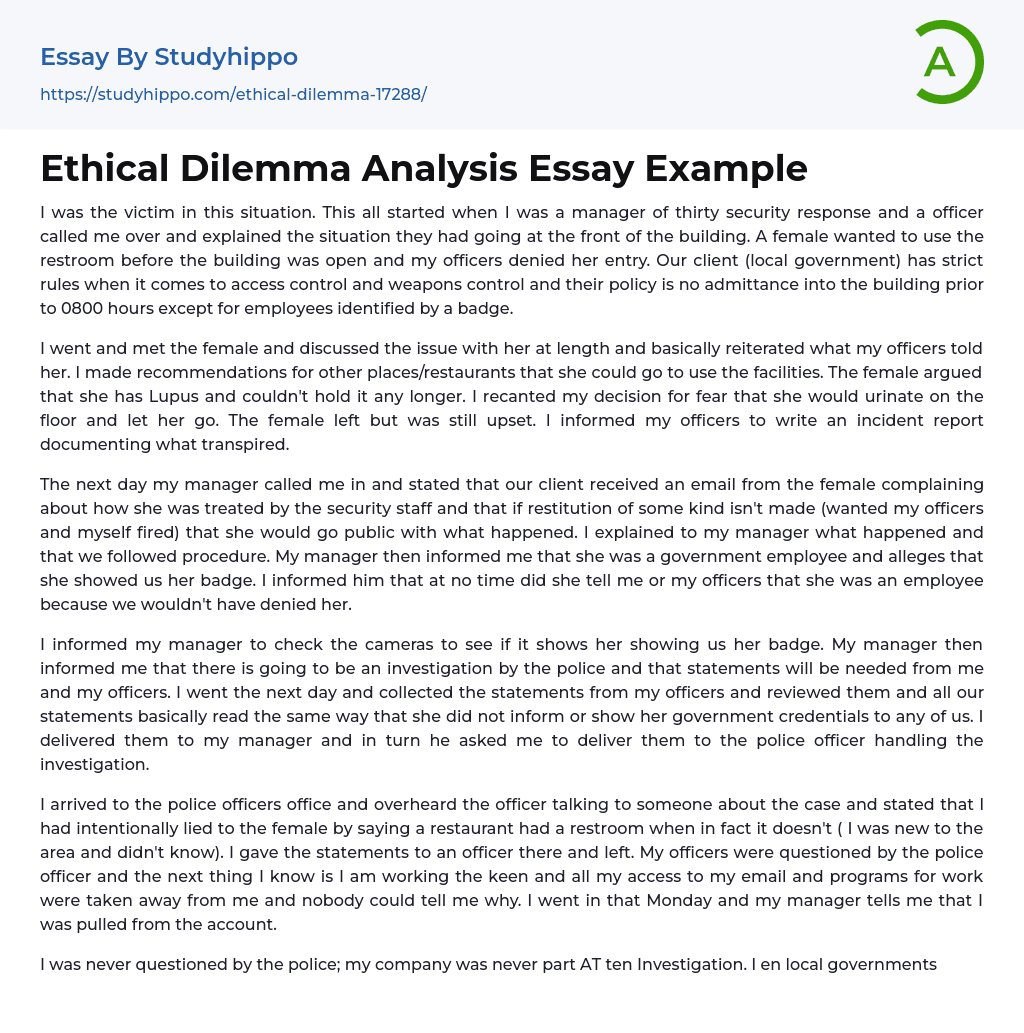As the manager overseeing thirty security response officers, I was informed by one of my officers about an incident at the front of the building. A female individual wanted to use the restroom before opening hours but was denied entry by our officers. Our client, a local government entity, strictly enforces access and weapons control policies that only allow employees with badges to enter before 0800 hours.
After speaking with the woman involved and thoroughly discussing the issue, I reiterated what my officers had already told her. I also suggested nearby establishments where she could use restroom facilities. However, she argued that due to her medical condition (Lupus), waiting longer was not feasible for her. Worried about potential accidents on the floor, I decided to change my initial decision and allowed her access.
Despite rea
...ching this resolution, she remained unhappy. To ensure proper documentation of what happened, I instructed my officers to write an incident report.
The next day, my supervisor called me and informed me that our client received an email from this woman expressing dissatisfaction with how our security staff had treated her.
She sent an email threatening to publicize the incident unless compensation was provided, even suggesting termination. I immediately told my manager and emphasized our adherence to protocols. My government employee manager claimed she showed us her badge, but I argued that none of us were informed about her status. To confirm her claim, I proposed reviewing the camera footage. As a result, my manager started a police investigation and asked for statements from me and my team members. After collecting and reviewing the statements, it was confirmed that she never
showed her government credentials to any of us. Subsequently, I gave the statements to my manager who instructed me to give them to the investigating police officer. While visiting the police officer's office, I overheard discussions implying that I intentionally lied about a restaurant restroom which was unknown to me as I was new in the area. After submitting the statements without being personally questioned, I left. Surprisingly, when I returned to work the next day, my access to email and work programs had been revoked without explanation. On Monday following this incident, my manager informed me that I had been removed from the account.Throughout this process, it is important to note that my company did not get involved in the investigation as it seemed to be part of our local government leader's re-election campaign. The decision to terminate my employment was made in order to appease the female involved and prevent any negative publicity that could potentially harm the leader's chances of being re-elected. My managers complied with this request to maintain the contract and protect employees' jobs. The local government also yielded in order to safeguard the leader's self-interest in securing re-election. Although I acknowledge that many managers lacked integrity, I now realize that, from the company's standpoint, they made the correct choice until it resulted in my unemployment and financial ruin. The local government leader demonstrated a deficiency in moral character except when it served his own personal interests. Regrettably, this decision had detrimental effects on our security program as it removed a senior manager and demoralized the security officers on the contract who knew we were innocent. As a manager, I
have faced similar ethical dilemmas where clients request tasks unrelated to security.
When working at a hotel, various responsibilities such as repairing toilets or valeting cars for guests are expected. The hotel provides clear guidelines and specifies the level of competence required for efficient execution of these tasks."It is essential to identify individuals who meet or surpass the client's expectations prior to assigning them to work at the location. The client becomes dissatisfied when they request a new officer because they feel that "nothing happened." They express their dissatisfaction with the officer's appearance not matching their desired public image. To fulfill the requirements of the contract, we replace the officer and provide training for our staff on the qualities of the new officer and how it can have a positive impact on our organization.
- A Policeman essays
- Agreement essays
- Business Law essays
- Common Law essays
- Community Policing essays
- Constitution essays
- Consumer Protection essays
- Contract essays
- Contract Law essays
- Copyright Infringement essays
- Court essays
- Crime essays
- Criminal Law essays
- Employment Law essays
- Family Law essays
- Injustice essays
- Judge essays
- Jury essays
- Justice essays
- Lawsuit essays
- Lawyer essays
- Marijuana Legalization essays
- Ownership essays
- Police essays
- Property essays
- Protection essays
- Security essays
- Tort Law essays
- Treaty essays
- United States Constitution essays
- War on Drugs essays
- Belief essays
- Deontology essays
- Ethical dilemma essays
- Moral essays
- Normative Ethics essays
- Values of Life essays
- Virtue essays
- Virtue Ethics essays
- Work Ethic essays




